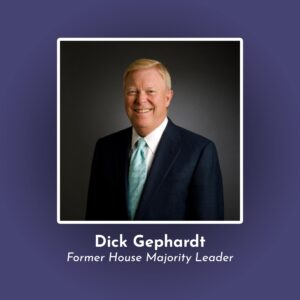
On this episode we welcome the Honorable Richard A. Gephardt to explore the challenges and opportunities present in our modern democracy.
In his first-ever podcast appearance, Leader Gephardt details what he believes to be the primary challenges facing the United States today. He explains the conflict of interest between the business plans of social media platforms, civil society, and functioning democracy. He contrasts 9/11 and the Iraq war to current polarization and Jan 6 episode, as well as discusses what he’s doing to help work toward solutions.
Gephardt additionally explains the importance of civic engagement, the importance of public service, and why he feels encouraged by the care that younger generations display for climate change and democracy.
About Richard Gephardt
Richard Gephardt is an attorney, author, lobbyist, and politician who served served 28 years in the United States House of Representatives. He is the President and CEO of the Gephardt Group, where he works to inspire a new understanding of citizenship based on activism to bring about economic, social, and political change.
Gephardt previously served as the United States House Majority Leader (1989-95) and House Minority Leader (1995-2003). He is the author of three books, including An Even Better Place and The American Immigrant: The Outsiders.
In French, we have a motto that says that a simple drawing is often better than a long explanation. Jean-Marc Jancovici Carbone 4 President
That’s very understandable because with left atmosphere thinking, one of the problems is that you see everything as a series of problems that must have solutions. Iain McGilchrist Neuroscientist and Philosopher
We can’t have hundreds and hundreds of real relationships that are healthy because that requires time and effort and full attention and awareness of being in real relationship and conversation with the other human. Nate Hagens Director of ISEOF
This is the crux of the whole problem. Individual parts of nature are more valuable than the biocomplexity of nature. Thomas Crowther Founder Restor
Show Notes & Links to Learn More
Download transcript14:30 – Demographics of people on social media/radio/broadcast tv (under vs over 45), toxic effects of social media
15:20 – Freedom of speech vs freedom of reach – Tristan Harris, Tristan Harris and Daniel Schmachtenberger with Joe Rogan
16:30 – Fairness doctrine
17:01 – 4th estate (journalism/media)
18:50 – AI and social media
20:18 – 66% of Republicans believe last election was won by Donald Trump
21:02 – Chinese model of government, new social media regulations and control of information, and youth restrictions
24:00 – People’s opinion on democracy, bipartisanship, etc.
28:16 – Worst division since 1860
42:05 – Maslow’s hierarchy of needs + Maslow changing the highest level
43:40 – People want purpose more than money
48:45 – After effect/policy action/Iraq war from 9/11
52:50 – January 6th 2021







